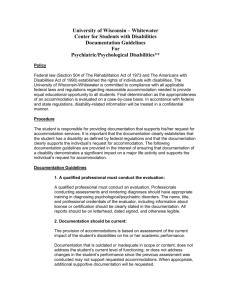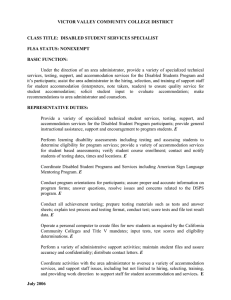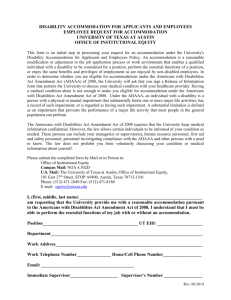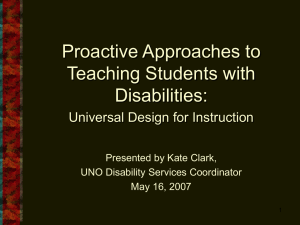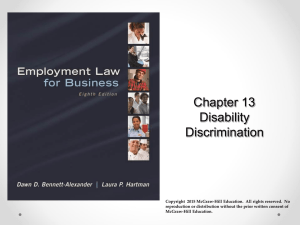Background- - California State University, Long Beach
advertisement
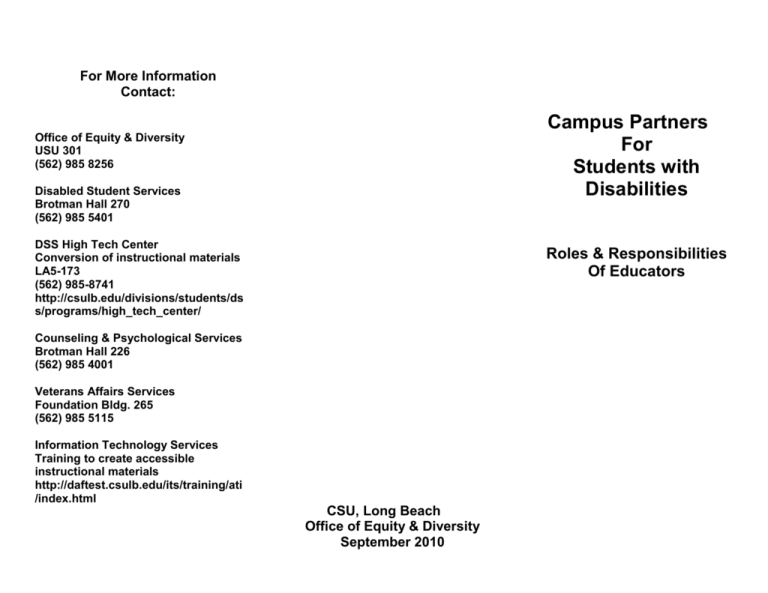
For More Information Contact: Campus Partners For Students with Disabilities Office of Equity & Diversity USU 301 (562) 985 8256 Disabled Student Services Brotman Hall 270 (562) 985 5401 DSS High Tech Center Conversion of instructional materials LA5-173 (562) 985-8741 http://csulb.edu/divisions/students/ds s/programs/high_tech_center/ Roles & Responsibilities Of Educators Counseling & Psychological Services Brotman Hall 226 (562) 985 4001 Veterans Affairs Services Foundation Bldg. 265 (562) 985 5115 Information Technology Services Training to create accessible instructional materials http://daftest.csulb.edu/its/training/ati /index.html CSU, Long Beach Office of Equity & Diversity September 2010 BackgroundSchools, colleges, universities, and other educational institutions have a responsibility to ensure equal educational opportunities for all students, including students with disabilities. This responsibility is based on Section 504 of the Rehabilitation Act of 1973 and Title II of the Americans with Disabilities Act of 1990, which are enforced by the U.S. Department of Education, Office for Civil Rights. locations, equipment and technology accessibility, etc. Creating and maintaining an academic environment that respects all students and applauds students’ efforts and aspirations. Research the architectural and/or physical accessibility of instructional activities and instructionally-related sites – entrances, paths of travel, labs, work stations, equipment. Use campus resources for advice and assistance such as Disabled Student Services, Equity & Diversity, CAPS, or Veterans Affairs Services. These individuals have expertise and experience that can be helpful in making the educational experience of students with disabilities a positive one for them and you. Be flexible in ways that nurture academic growth and development, as well as in methods and measurements of learning. Informing students of their right to request accommodation due to disability and referring them to Disabled Student Services to discuss their needs and arrangements. RoleAs part of your fundamental role as an educator, you are responsible for: Recognizing that disability and accommodations should be discussed in a confidential and private setting – not the classroom and that every effort should be made to restrict general knowledge as much as possible. Responding timely to requests for accommodation by working with Disabled Student Services in a spirit which is facilitative and supportive to the student. Seeking advice and information on types of reasonable accommodation e.g., notetaking, tape-recording, test proctoring, accessible or alternative format for texts and instructional materials, physical access for off-site Positive Steps Order textbooks & instructional materials timely so they can be converted to accessible format. Learn how instructional materials such as study guides, projector overheads, articles, notes, tests, could be prepared in accessible or alternate format – large print, computer disk, text on tape. Include a statement in course syllabi regarding accommodation such as, “If you have a need for accommodation due to disability, please notify me as early as possible, but no later than two weeks from the date the course begins.” Be aware that learning disabilities impact HOW individuals learn, and not how well they learn. View accommodation as an equalizer NOT as an advantage.
